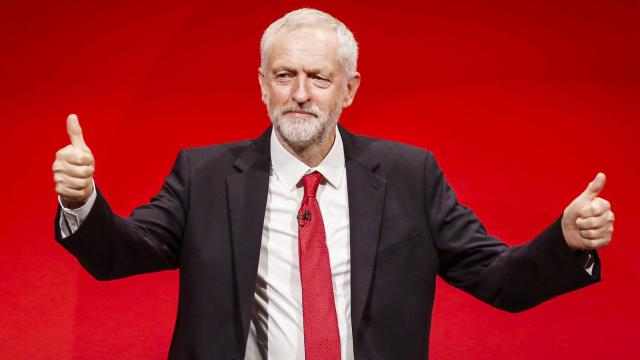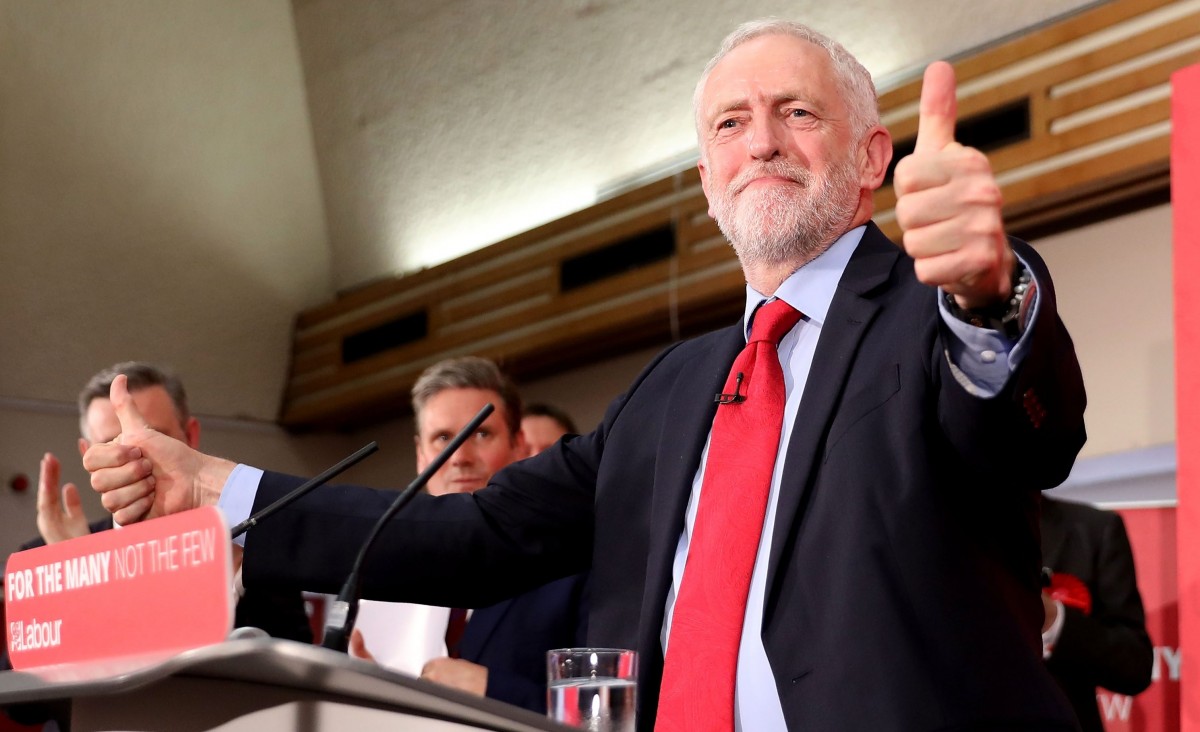
Neoliberalism is dying. What has been business as usual since the 1980s cannot continue due to climate change, inequality and other systemic crises. Neoliberalism’s promise that it will benefit everyone is false. It does not. To maintain their grip on power, the 1% are scapegoating the weak and vulnerable, deflecting attention away from their own skyrocketing profits. In the process, billionaires sponsor far-right and racist demagogues such as Donald Trump.
But opposing this authoritarianism – and moving beyond neoliberalism – there are many democratic pathways. Hope is emerging. The recent British election is a further breakthrough. Even in the capitalist core of the West, another progressive world is possible. British corporate media billed the election as a landslide for incumbent Conservatives under Prime Minister Theresa May. But she lost seats and her outright majority standing on policies, quite frankly, similar to Donald Trump.
Instead, the Labour Party led by Jeremy Corbyn, long defined as "unelectable" by the establishment, won the largest shift of votes toward the party since WWII. He stood on a socially and ecologically progressive platform. The Conservatives now have to rely on the extremist DUP party, violent Unionists from Northern Ireland, to hold a majority. The government could collapse at any moment. To weather the situation, it is watering down its austerity and neoliberal policies, desperately clinging to power. If there is another election, the momentum is behind Corbyn and they know it.
Shattering Neoliberalism’s Foundations
Along with U.S. President Ronald Reagan, Prime Minister Margaret Thatcher was a key architect of the neoliberal period. Asked once about her greatest achievement, Thatcher said, “Tony Blair and New Labour; we forced our opponents to change their mind.” For a long time this held true. Jeremy Corbyn finally ended her legacy. Yet Thatcher’s mindset was echoed in the hostility that Corbyn and his supporters have faced since he rose to lead Labour.
What is defined as possible and acceptable by society is known as the Overton Window. Before the election, the UK establishment and billionaire-owned media suggested that Corbyn’s plan to create a society for the many – one that taxes the rich to provide for the poorest – was an unacceptable joke. They said encouraging people to vote who normally did not, especially the youth, was wishful thinking. It turned out in this month's General Election, youth turnout was the highest it has been since 1992.
Corbyn succeeded even though the traditional left was hostile to him. He did well even against the majority of media going into overdrive with fear-based journalism as Election Day approached. What the election showed, therefore, is that the hold Murdoch and other media moguls have over the British population may be waning. Many people, especially the youth, are turning to digital and social media and this is having a major impact on politics.
Reframing Politics
Before winning the election, the Overton Window of British politics focused on Middle England. The voters it counted were considered small-c conservative. From 1997 to 2015, New Labour tried to push a Tory-lite agenda there. Corbyn’s shift in direction was supposed to cause a landslide win for the Tories. But surprisingly, this didn't happen.
Instead, Corbyn repositioned the Overton Window appealing to non-voters with social justice. In fact, he went beyond the view of Middle England, going to rhetorical places where opposition leaders have rarely tread. In retaliation, Corbyn supporters were derided as young and naïve, with unfair expectations of what society can achieve. They were attacked the way young people are often called "snowflakes," meaning too utopian or worried too much about the crisis of the modern age.
But despite the picture the billionaire-owned media or politicians tried to paint of them, in reality their concerns about climate change and economic opportunity resonated. The global lesson from the British election is that it is possible to rip up – and rewrite – the rulebook about who will vote. You can win fighting against inequality. Many snowflakes can have a snowballing effect. Targeting the youth and non-voters caused an avalanche of votes for Corbyn.
Breaking Neoliberals' Golden Rule
What this shows the world is that traditionally left-wing parties that have succumbed to neoliberalism could emulate this political avalanche. Essential aspects of Corbyn’s success include the tireless work of activists knocking on doors to get people to register, and then to vote. Importantly, Corbyn has always stood alongside the social movements, and in the hour of need, they returned the favor.
More broadly, social movements have consistently worked to both hold back the worst excesses of neoliberal capitalism and to keep alive the message that another world is possible. What is also essential to recognize in the fight between democracy and authoritarianism, which are both in conflict to supersede neoliberalism, is that parliamentary politics is only one route.
Other Paths to Another World
Spain offers a case study in positive political flux. There, citizens are reclaiming power through self-organized networks and citizen-led groups. For instance, 15MpaRato is on track to jail one of the country’s most corrupt banker-politicians. Networks have galvanized to take back city power, with radical mayors now running many of Spain’s biggest cities, like Ada Colau in Barcelona. In Catalonia, in fact, independence is providing a possible pathway beyond neoliberal capitalism – including potentially forming a new country with a crowd-sourced constitution. In addition to these routes, the Podemos Party shows how a new progressive party can shatter the dominance of neoliberal parties.
Other alternative systems include Rojava in northern Syria, where local councils hold power autonomously in a bottom-up system. Parallels can be made with the Zapatistas in autonomous indigenous regions of Mexico. In Iceland, the Pirate Party and digital democracy are making particular headway. Across the Nordic region, from Denmark to Finland, northern nations have continued with a social democratic model, one that seems radically progressive relative to the now crumbling neoliberal consensus.
Green and other new parties have also made considerable headway. Notably, Austria’s President Van der Bellen, a Green, won a two-horse race against a neo-Nazi. The Dutch Greens recently beat an expected far-right surge.
Clear parallels are emerging between what happened earlier this month in Britain and what has been happening for several years in other countries. Each social movement that generates a surprise election helps shatter the neoliberal facade. Imagination and ingenuity in politics are proving vital to envisioning a society that tackles systemic issues. Equally important, this vision needs a vehicle around which people can be galvanized.
Corbyn's win demonstrated that in the stale world of parliamentary politics, we need to tear up the rulebook. We need to be realistic about the systemic crises we face. And we need, above all, to demand the impossible.
3 WAYS TO SHOW YOUR SUPPORT
- Log in to post comments
















